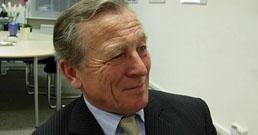Sir Percy Molesworth Sykes (1868-1945) was a Brigadier-General of the British military, diplomat and orientalist who learnt Persian in India and represented Britain in eastern and southern parts of Persia. In 1916 he established a Persian military force under British command called The South Persia Rifles. Through his numerous writings on Iran and Afghanistan Sir Percy is renowned as one of the most prominent orientalists of the early 20th century.
The multimedia report on this page consists of photos taken by Sir Percy Sykes in the Pamirs and Chinese Turkistan and is narrated by the British author Anthony Wynn, who wrote 'Persia in the Great Game'. The following piece is a shorter version of his article etitled 'Kashghar and the Pamirs: A Consular Tour'.
Anthony Wynn
In the late nineteenth century, at the height of the Great Game, the city of Kashgar in Eastern Turkistan, at the foot of the Chinese side of the Pamirs, lay at the centre of a triangle with Russia to the west, China to the east and India to the south. Peopled largely by Muslim Turki-speaking Uighurs, it was the westernmost part of the Chinese empire, but internal communications were so bad that Peking had only a very loose hold over the province. To reach Kashgar, Chinese goods had to be shipped by sea to Batumi on the Black Sea, then overland to Baku, and then by ferry across the Caspian to Krasnovodsk, to join the Russian railway via Samarkand to Andijan. From there it was a matter of carts, pack poinies, yaks and camels to Kashgar. It was therefore far easier for the Kashgari merchants to trade with Russia. At the end of 1890 the British government of India became concerned by Russian penetration of the area and sent George Macartney out to establish a consulate at Kashgar to keep an eye on Russian activity. By 1915 he had been there for twenty-four years, and had been granted only two home leaves. The authorities felt that, twelve years since his last leave, he and his wife might be ready for a short break.
The person sent to relieve him was Sir Percy Sykes. Sykes had been a consul in eastern Persia since 1894 and had made a name for himself as an explorer and a politically astute man of action. His wife, with six small children, felt it beyond the call of duty to accompany him to this remotest of British outposts, so he called on his unmarried elder sister Ella to come out with him and keep house for him. She was a tough and fearless traveller, who had ridden from one end of Persia to the other with her brother fifteen years earlier.
Kashgar was the most isolated of all the British consulates at that time. Despatches to India took three weeks to get there by runner. Social life was limited. Apart from a dozen rather boisterous Russians at the consulate, there were some dour and teetotal Swedish medical missionaries, who disapproved of the Russians and would have nothing to do with them. The Russians were good company, but their idea of a decent dinner party was one that ended at dawn, which was a little trying for Ella.
In 1877 China had regained control of Eastern Turkistan from the local Uighur beys. At the end of 1911 the republican Sun Yat-Sen revolted against the corrupt Manchu emperors, which threw the country into a state of turmoil. Chinese Turkistan was split between the republicans and the supporters of the Manchus. The Russians, following their usual pretext of protecting foreign subjects in danger, sent in an occupying force of a thousand Cossacks and four hundred riflemen, whom the Chinese were unable to resist. The Russians were one step closer to India.
As the Great War spread, the Turki-speaking province of Eastern Turkistan became of interest to the Germans and their Turkish allies, who were dreaming of ‘setting the East ablaze’ with a revolt that would sweep all the way to India and destroy the British Empire. Turkish agents began to use Eastern Turkistan as a base from which to stir up the tribes on the borders of India and in Russian Turkistan. In February 1915 a party of five Turks appeared in Kashgar. Macartney learned that in the spring they intended to travel to Afghanistan and attempt to incite the Afghans to join the fight against the British. When he asked the Chinese to send them back, the answer they gave was that China was neutral and had no reason to exclude them.
Shortly after his arrival in Kashgar, Sykes was watching another party of Turks heading for Afghanistan. Sykes and the Russian consul, acting together, arranged for the Taoyin, the local governor, to detain them. In May yet another party of Turks appeared and was arrested by the Russian Cossacks on the border. Two months later another party of Turks came, this time ostensibly to open some schools. The Kashgar merchants were firmly opposed to the introduction of any new ideas that they could not control and, encouraged by the Russians – or so the Turks claimed – paid the mullas to denounce the Turks from their pulpits. The points that the mullas insisted on were:
Ottoman Turkish was not to be taught in the schools.
The only subjects to be taught were Arabic and religion.
Nationalist and ethnic poems and anthems were to be deleted from the syallabus.
Handwriting was not to be taught in the Ottoman but in the Kashgari style.
Students were to wear turbans and long coats, not European dress.
Greeting was to be in the form of a loud Es-selaamun aleykumI and not a salute.
History and geography were not to be taught and school books should carry no illustrations.
Life in the Kashgar oasis revolved around the peaceable cultivation of raisins and water-melons. To seek relief from the tedium of life in irrigated country Sykes and Ella left the oppressive heat of June to explore the Pamir mountains, where there were passes out of Russia that needed mapping. Russia, for the moment, was an ally of the British but might not always remain so. During his years as consul in Persia Sykes had seen much of Russian perfidy and disregard for treaties. Russia was allied to Britain now, since both were at war with Germany, but Sykes was not convinced that the Russians had abandoned their project to annex India to their eastward-spreading empire.
With eighteen pack ponies to carry their supplies, Sir Percy and his sister set off across the fast-flowing Gez river up to Lake Bulangul and the country of the Kirghiz nomads, who welcomed them into their felt ak-oys, which were much warmer and more comfortable than their camping tents. As they climbed, they changed their pack ponies for yaks and reached the 16,000 foot crest of the Katta Dawan pass, with its spectacular view of the Great Karakul Lake down on the Russian side. They visited Pamirski Post, the Russian military outpost at the head of the Murghab valley, which forms one of the headwaters of the Oxus.
Crossing back into Chinese territory at Tagharma, with its astounding view of Muztagh Ata (Father Ice Mountain), the Sykeses were treated to a display of olak tartush, the Kirghiz equivalent of the Afghan bozkashi, a form of mounted rugby with a goat carcase for a ball. The players compete in a free-for-all to pick up the carcase and carry it off round a post in the distance and back to the starting point.
The Sykeses made a detour on the Russian side to the Sarikol valley, populated by Ismaili Muslims who spoke Sogdian, a very ancient form of Persian. They were followers of the Aga Khan. The Aga Khan, who lived in India, was a British subject and thus, by extension, the Sarikoli Ismailis considered themselves to be British subjects and entitled to British protection.
In September Sir Persy and Ella set off once more on tour, this time along the southern edge of the Taklamakan desert to the oasis cities of Yarkand [present-day Shache] and Khotan.
Yarkand they found to be the most fertile and prosperous of the southern oases. The Yarkandis, who did not boil their drinking water, suffered famously from goitre. At each town the Sykeses received the respects of the Ak Sakal (White Beard), or British agent, who was usually the senior Indian merchant. There was a network of these Ak Sakals across the whole of Eastern Turkistan. As well as representing their own little community, they passed news of local goings-on back to the British consulate in Kashgar. There was nothing underhand about this arrangement, of which the Chinese were perfectly well aware. Under Chinese capitulations the Indians were subject to British law and it was the Consul’s duty to settle their disputes with the Chinese authorities.
To reach Khotan the Sykeses had to ferry the horses across the wide Yarkand river, which carried melting summer snow-water northwards to disappear in the desert. Khotan was famous for jade and for its silk. It was from there that in AD550 silkworm eggs had been stolen and taken to Byzantium to break the Chinese monopoly on the trade. In each of these towns Sykes had to visit the local governor and, with the Ak Sakal, settle all the Indians' disputes, some of which had been outstanding for years, before he and Ella could return to Kashgar.
In November 1915 the Macartneys came back from leave and Ella and her brother set off on the long journey home through Russia to England and back to the Great War. Four months later Sykes was to land at Bandar Abbas on the Persian Gulf with a handful of British army officers and Indian warrant officers to raise the regiment of South Persia Rifles to deal with the German infiltration of southern Persia.
Sykes, P.M., and Sykes, Ella, Through Deserts and Oases of Central Asia (London, 1920)
Wynn, Antony, Persia in the Great Game - Sir Percy Sykes:Explorer,Consul, Soldier,Spy (John Murray 2003)
Macartney, Lady, An English Lady in Chinese Turkistan (Oxford, 1985)
Tyler, Christian, Wild West China (John Murray, 2003)
Ahmet Kemal İIlkul, Çin-Türkistan Hâtıraları (Ötüken 1997), an account of the adventures of the Turkish teachers in Kashgar.


